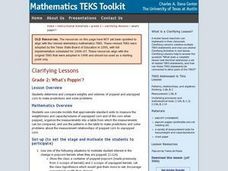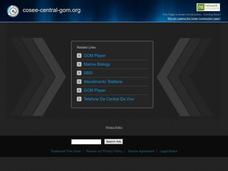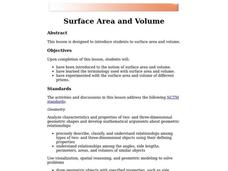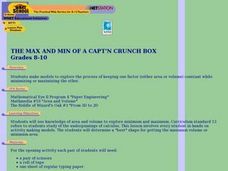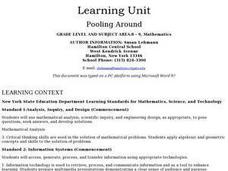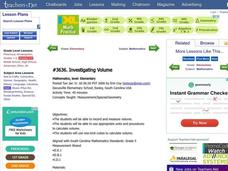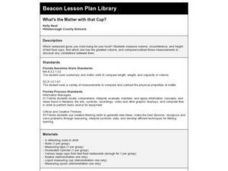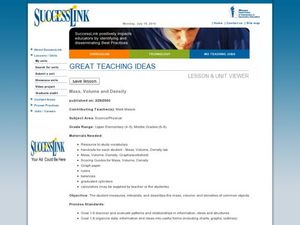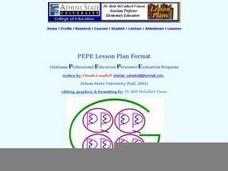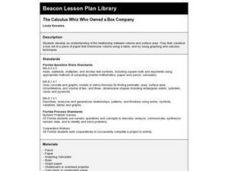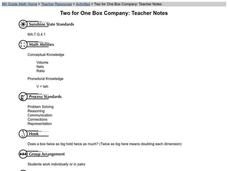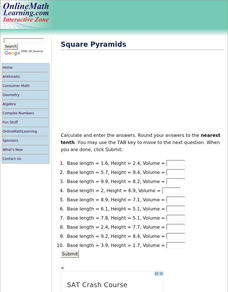Curated OER
What's Poppin'?
Second graders determine and compare weights and volumes of popped and unpopped corn to make predictions and solve problems. Students combine the data of each group into a graph. They construct questions, statements and story problems...
Curated OER
Calculating Volume
Young scholars evaluate mathematical problems using the formulas for volume. They recognize "perspective" in different shapes including cubes, pyramids and cylinders. Students practice on brainstorming all the different shapes and how...
Curated OER
Defining Density as a Relationship
Students review the relationship between mass and volume is constant for a pure substance under standard conditions. They complete mass and volume worksheets using formulas for calculating density.
Curated OER
Measure Object Using English and Metric Systems
Students are able to measure various objects using English and metric systems within half of the smallest unit of the measurement device. Students identify units of length, volume, mass and temperature according to International System...
Curated OER
Surface Area and Volume
Students are introduced to the notion of surface area and volume. Students review surface area and volume by finding the area of a two-dimensional shape. They practice using the computer to create different surface area shapes.
Curated OER
Squares and Cubes
Middle schoolers recognize, analyze, and use square color tiles and interlocking cubes to discover patterns in perimeter, area, and volume. They will then chart and graph their results.
Curated OER
the Max And Min of a Capt'n Crunch Box
Students use knowledge of area and volume to explore minimum and maximum. They create models and determine a "best" shape for getting the maximum volume or minimum area.
Curated OER
A Cylinder Workshop
Students work with given formulas to solve for specific variables. The calculation of the volume of a cylinder and the change in volume when there is a constant surface area is analyzed in this lesson.
Curated OER
Pooling Around
Students complete a unit of lessons on computing area and volume. They play a Jeopardy game of basic area formulas, calculate surface area of shapes, develop a Powerpoint presentation, and conduct a simulation of finding the surface area...
Curated OER
Investigating Volume
Learners investigate the components of volume and use appropriate units and procedures to calculate the volume of several household boxes.
Curated OER
Paper Architecture - Designing Human Spaces
Students design, then construct an architectural structural model of a two-person dwelling. Then, Students, in groups, plan a city layout.
Curated OER
Diving Raisins
Young scholars hypothesize and observe what occurs when raisins are dropped in a carbonated liquid. They examine buoyancy and how density effects ascent and descent.
Curated OER
More Volume Please! Don't Be Dense!
Fifth graders determine volume and density through their knowledge of mass, volume and density.
Curated OER
What's the Matter with that Cup?
Fourth graders measure volume, circumference, and height of fast food cups, find which one has the greatest volume, and compare/contrast those measurements to discover any correlations between them.
Curated OER
Mass, Volume and Density
Students compare and contrast the mass, volume, and density of various objects. They use a triple beam balance, measure and record the volume of a cup of water, and discuss the results.
Curated OER
Capacity and Volume
Second graders estimate capacities, compare pints and quarts, and identify pints and quarts.
Curated OER
The Calculus Whiz Who Owned a Box Company
Young scholars use the relationship between volume and surface area to construct a box out of a piece of paper that maximizes volume using a table and by using graphing and calculus techniques.
Curated OER
New Ideas, New Materials
Students create a three dimensional work while exploring the use of unconventional materials to create specific textures and designs. They explore basic concepts such as volume, form, texture and balance.
Curated OER
Two for One Box Company
Eighth graders experiment to decide if a box that is twice as big holds twice a much. They work the concept of volume and how changing dimensions affect it.
Curated OER
Density Discoveries
Students participate in Density Discoveries, which is a hands-on learning opportunity for students to find the mass, volume, and density of solid matter.
Curated OER
Choral Speaking: The Frog on the Log
Students recite the poem, "The Frog on the Log" paying particular attention to precise diction, pacing, projection, inflection, volume and rhythm.
Curated OER
Two for One Box Company
Students draw a net (a two-dimensional pattern that can be formed to make a solid) for making an open top box on grid paper. They cut out the net and fold up each side to form the open box and tape the sides, then find the volume of the...
Curated OER
Pond Water Survey
For this survey worksheet students complete a series of short answers to questions on data collection, volume and populations of organisms.
Curated OER
Square Pyramids
In this online math learning exercise, high schoolers practice finding the perimeter and the volume of a variety of square pyramids. When complete, students submit their answers and get instant feedback regarding their accuracy.


